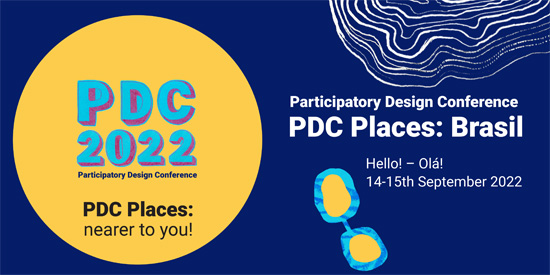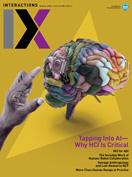Authors: Rachel Clarke
Posted: Mon, January 31, 2022 - 4:07:02
I read an article recently that suggested with the growth of online and hybrid conferences in response to Covid-19, there were more opportunities for everyone. The focus of the article was on celebrating the enabling potential and design of technology to make this happen. But after spending the past two years attending online conferences and now serving as general co-chair for the 2022 Participatory Design Conference (PDC 2022), I think it’s a mistake to focus on what technology can or cannot bring to the table in trying to make conferences more equitable.
Technology, in all shapes and sizes, offering all sorts of novel interactions for online conferencing and meetings, has been at the front of our brains for many working hours as we hastily integrated and abandoned new apps while juggling alternative ways of working and domestic life. Many conferences took on this challenge recognizing that our reliance on the face-to-face conference model, while benefiting many, also excludes many interesting scholars and practitioners. Extortionate prices for flights, accommodation, and attendance; being away from family; care responsibilities; language; access to existing networks; CO2 emissions—all are key issues that have always existed, but recently became more apparent. In organizing PDC 2022 with co-chairs Yoko Akama and John Vines, we recognized these challenges before the pandemic. We felt there were also other approaches to reconceptualizing what conferences could look like if they were more decentralized, encouraging a greater respect for a diversity of place-based responses to particular themes before working on the technology.

PDC 2022 branding by Ellen McConnell
PDC 2020 was hosted in Colombia, despite the fact this had to quickly become an online-only event. This showed what could be done with a more localized approach to engaging a global network of scholars and practitioners doing and discussing PD while drawing from a strong tradition of political Latin American activists and theorists.
PDC Places is a new initiative for PDC 2022 where distributed face-to-face and hybrid gatherings will take place across 11 different locations around the globe before, during, and after the conference program in August. As general chairs, we were keen to find ways of addressing and reaffirming our commitments to equity and sustainability and a more distributed place-based approach to PD as a diverse set of practices and concerns, beyond Europe and the U.S., despite technically hosting part of the conference in Newcastle, U.K.
We’ve been lucky to have the extraordinary expertise of Reem Talhouk and Andy Dearden leading the way in helping to take this vision forward through a lively network of scholars, practitioners, and industry professionals. We initially received 18 expressions of interest to run PD events around the globe, which created a lot discussion between potential hosts and Places chairs to define how we can practically make this vision happen. We’re now working on consolidating opportunities for meaningful connection across Places hosts including creating a flexible program and branding strategy that can be personalized and work with different languages.
Time zones, language, and facilitation
Some of the ways we are trying to build these connections is carefully planning for time-zone scheduling, multilingual translation, and facilitation. We’ve spent hours mapping time zones, creating “touchpoints” for when different countries can reasonably connect with each other online and without people feeling the need to wake up in the middle of the night. One of the challenges of global online conferences is people not sharing the same time zone. It sounds obvious, but most conferences take place in one time zone that best suits the conference hosts. This makes a lot of sense, but time zone scheduling has enabled us to rethink and plan for running hybrid and online sessions, being mindful of when different countries are likely more able to connect across Europe and Africa, Australasia, and the Americas to avoid the limits of time-zone silos.
We’re planning for a day of hybrid multilingual events to include keynotes and panels. It was our intention to spread these multilingual events throughout the conference, but working with Newcastle University’s School of Modern Languages, our plan is to have several different languages, and focus on one day, due to the complexities of translator scheduling, setup, and costs. We are, however, also hoping that more informal translation can take place. One of our workshop chairs, Angelika Strohmayer, mentioned a conference she had attended recently where people provided more intimate whispered translations encouraging more informal interpretation, which is in the spirit of generosity and the kind of conference atmosphere we hope to create.
It’s also important to recognize the importance of creating connection through careful facilitation between global communities. Nowhere is this more important than in facilitating hybrid online and face-to-face dialogue. Facilitation is definitely a craft not always appreciated, but we’ve learned a lot on how important facilitation and chairing sessions is to making any discussion work well and making the most of our time together, whether this be online, face-to-face, or in a hybrid environment. We’re hoping we can do this in a way that supports panel and paper chairs to embrace this approach providing guidance and sharing practice and experience from the past two years.
Online platform
And finally, yes, the technology. We have started to design a bespoke online platform that bolts together different videoconferencing, scheduling, and networking tools that run on low bandwidth, mindful of places where intermittent online access still presents lags and outages. We have already used these platforms in our lab during large-scale global gatherings including MozFest, IFRC Climate Red, and ServDes at RMIT. We’ll have all the usual things that the PD community have nurtured over the years—presentations for full papers, exploratory papers, situated actions and exhibition, workshops and doctoral colloquia, beyond academia, panels, and awards—but we are also encouraging people to be creative and experiment with hybrid formats. There will also be representation from our PDC Places communities and activity to further bring to life events happening across the globe. There has been so much discussion about how the online experience has diminished the conference experience as a whole. Many of us have felt this, but there are also people doing some really creative things with the technology too, not necessarily creating better experiences than being face-to-face, but aiming to create alternative experiences with what they have to hand.
The technology is important for helping us achieve these things, but we are also very excited to welcome people to Newcastle city itself as part of the conference experience with our unique urban, rural, coastal landscape. Some of our workshops will be hosted at the Urban Sciences Building at Open Lab, and our situated actions and exhibition program will have a combination of online content, short films, live performances and a visual art exhibition. Rather than have a significant number of presentations, though, we will focus on making the most of our time together for focused discussion too where, if people can make it, we will see you in person very soon.
PDC 2022 will take place online from August 19th, with events in Newcastle upon Tyne, U.K. from August 30 to September 1, 2022 (https://pdc2022.org)
Posted in: on Mon, January 31, 2022 - 4:07:02
Rachel Clarke
View All Rachel Clarke's Posts







Post Comment
@Alvin (2025 06 16)
8 Ball Billiards reminds me of classical billiards. So fun.